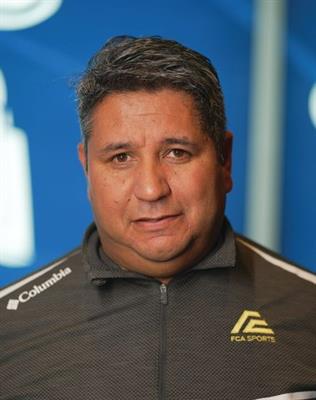This article appears in the Spring 2024 issue of the FCA Donor Publication. The FCA publication is a gift from our FCA staff to all donors giving $50 or more annually. For more information about giving, visit here.
Growing up around soccer in Chile, Luis Alfredo Sepulveda Larraguibel played to the professional level before feeling God’s call on his life to move into a pastoral role at age 18. Still invested in his teammates, Larraguibel desired to pour into players and tell them the Good News of Jesus. He unofficially began chaplaincy with schools and club teams until he connected with FCA Brazil Leader Julio Bautista and then-FCA West Global VP Jim Roquemore at a conference in Buenos Aires in 2012. When Roquemore visited Chile a year later and saw all the chaplaincy work happening at the pro and elite levels, he encouraged Larraguibel to consider training other chaplains. Since then, Larraguibel has worked as a chaplain in professional soccer leagues, the Pan American Games and the Parapan American Games. He has a heart to train more chaplains for the good work of walking alongside athletes who need the love of God.
What does chaplaincy look like for you?
It’s to serve the athletes and coaches [and] being willing to help them in any way they need. When professional soccer players arrive in the country, they don’t know where there is a pharmacy or a doctor. I start by helping in those basic things and build relationships until I have the possibility to present the Gospel. When I left soccer to be a pastor, I wondered why I was leaving sports. Now, I see all the athletes I talk to and how I am still using sports, and I see there was a purpose in everything. I have a nickname in Chile: “the soccer player pastor.” That is who I am known as.
What does it mean for you to be serving as a chaplain?
I am answering a call from God. I started learning on my own, watching YouTube videos, going to the soccer field, visiting my teammates. I started doing chaplaincy without knowing what chaplaincy was! There are few who have access to elite athletes. I am in a position of trust and get to show coaches and athletes that God is on the field.
YouTube videos, going to the soccer field, visiting my teammates. I started doing chaplaincy without knowing what chaplaincy was! There are few who have access to elite athletes. I am in a position of trust and get to show coaches and athletes that God is on the field.
What have been some takeaways from being part of chaplaincy at the Pan American Games?
Someone in the government knew about FCA and asked me to come and train other chaplains who were not involved in sports, to prepare for the Pan American Games. I put together a sports chaplain team with FCA chaplains I knew in other Latin American countries. I trained and prepared them for the Pan American and Parapan American Games. There was different training to work with the disabled because there is different vocabulary and language you have with them.
Last fall, we were available for athletes to talk to, those who knew God and who didn’t. Many athletes came for a blessing, as it is like a tradition in Latin America—blessings are almost a magic, a superstition. After competition, they come because they didn’t medal or meet their goal. They wonder if they should continue in sport.
What would you tell them when they came in disappointed or discouraged?
For those who know God, I tell them that God has a purpose with them whether they win or lose. Whatever they are doing—whether it is them running, throwing or jumping—God is to be glorified in what they do. God is the One who matters.
In the case of the ones who are not Christians, even though they have won trophies and medals, they feel this void. That’s when we like to share about God.
Is there anything difficult or challenging about being a chaplain?
Time. I’m officially working with three clubs, but I help [approximately] 15 clubs. And then I have individual athletes from each of those clubs. I’m tired. But I am sustained by passion for the athletes. I share with them [that], like their physical training, they have to train their faith. It’s a lot of preparation. Their responsibility is to get ready for God to do His part in their lives.
And people. We need to multiply chaplains to make connections for future athletes. For example, after the Pan American Games, a lot of people wanted to know how they can join FCA and volunteer; they wanted trainings in their areas. And we have Chilean players here for soccer, and they go to Argentina to play. We can connect them with the Argentinian chaplain, so they stay connected in their faith and FCA. My dream is to bring more chaplains to this level of elite athletes.
-FCA-
Photos courtesy of Luis Alfredo Sepulveda Larraguibel